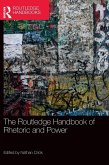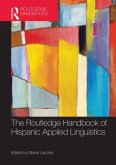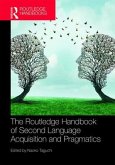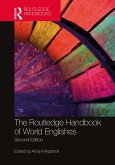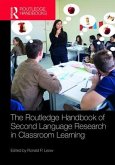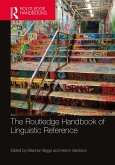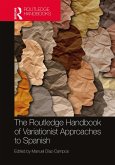The Routledge International Handbook of Ethnomethodology
Herausgeber: Dennis, Alex; Lindwall, Oskar; Mair, Michael; Jenkings, K. Neil; Carlin, Andrew P.
The Routledge International Handbook of Ethnomethodology
Herausgeber: Dennis, Alex; Lindwall, Oskar; Mair, Michael; Jenkings, K. Neil; Carlin, Andrew P.
- Gebundenes Buch
- Merkliste
- Auf die Merkliste
- Bewerten Bewerten
- Teilen
- Produkt teilen
- Produkterinnerung
- Produkterinnerung
This volume offers a comprehensive overview of the most pressing issues and developments in the field of Ethnomethodology, including ethnomethodological Conversation Analysis, and highlights new and emerging areas for research.
Andere Kunden interessierten sich auch für
![The Routledge Handbook of Rhetoric and Power The Routledge Handbook of Rhetoric and Power]() The Routledge Handbook of Rhetoric and Power318,99 €
The Routledge Handbook of Rhetoric and Power318,99 €![The Routledge Handbook of Hispanic Applied Linguistics The Routledge Handbook of Hispanic Applied Linguistics]() The Routledge Handbook of Hispanic Applied Linguistics326,99 €
The Routledge Handbook of Hispanic Applied Linguistics326,99 €![The Routledge Handbook of Second Language Acquisition and Pragmatics The Routledge Handbook of Second Language Acquisition and Pragmatics]() The Routledge Handbook of Second Language Acquisition and Pragmatics314,99 €
The Routledge Handbook of Second Language Acquisition and Pragmatics314,99 €![The Routledge Handbook of World Englishes The Routledge Handbook of World Englishes]() The Routledge Handbook of World Englishes330,99 €
The Routledge Handbook of World Englishes330,99 €![The Routledge Handbook of Second Language Research in Classroom Learning The Routledge Handbook of Second Language Research in Classroom Learning]() The Routledge Handbook of Second Language Research in Classroom Learning314,99 €
The Routledge Handbook of Second Language Research in Classroom Learning314,99 €![The Routledge Handbook of Linguistic Reference The Routledge Handbook of Linguistic Reference]() The Routledge Handbook of Linguistic Reference314,99 €
The Routledge Handbook of Linguistic Reference314,99 €![The Routledge Handbook of Variationist Approaches to Spanish The Routledge Handbook of Variationist Approaches to Spanish]() The Routledge Handbook of Variationist Approaches to Spanish318,99 €
The Routledge Handbook of Variationist Approaches to Spanish318,99 €-
-
-
This volume offers a comprehensive overview of the most pressing issues and developments in the field of Ethnomethodology, including ethnomethodological Conversation Analysis, and highlights new and emerging areas for research.
Hinweis: Dieser Artikel kann nur an eine deutsche Lieferadresse ausgeliefert werden.
Hinweis: Dieser Artikel kann nur an eine deutsche Lieferadresse ausgeliefert werden.
Produktdetails
- Produktdetails
- Verlag: Taylor & Francis Ltd
- Seitenzahl: 404
- Erscheinungstermin: 31. März 2025
- Englisch
- Abmessung: 246mm x 174mm
- ISBN-13: 9780367340971
- ISBN-10: 0367340976
- Artikelnr.: 71230721
- Herstellerkennzeichnung
- Libri GmbH
- Europaallee 1
- 36244 Bad Hersfeld
- gpsr@libri.de
- Verlag: Taylor & Francis Ltd
- Seitenzahl: 404
- Erscheinungstermin: 31. März 2025
- Englisch
- Abmessung: 246mm x 174mm
- ISBN-13: 9780367340971
- ISBN-10: 0367340976
- Artikelnr.: 71230721
- Herstellerkennzeichnung
- Libri GmbH
- Europaallee 1
- 36244 Bad Hersfeld
- gpsr@libri.de
teaches Library & Information Management at the School of Education, Ulster University, Coleraine (UK). His areas of interest include ethnomethodology and information. He is co-editor of the Routledge book series Directions in Ethnomethodology & Conversation Analysis. 0000-0001-5138-9384 Alex Dennis is a Lecturer in Sociology at the University of Sheffield. He is the author of Magic, Science and Society (Routledge), and co-editor of two special journal issues on ethnography and ethnomethodology. ORCID number 0000-0003-4625-1123 is a senior researcher at Newcastle University, UK. He has authored and co-authored numerous publications on various social phenomena including health service organisation and decision-making practices, military and society, and rock-climbing. He is co-editor of the Routledge book series Directions in Ethnomethodology & Conversation Analysis. Orcid: 0000-0003-3513-2823 is a Professor in Communication at the Department of Applied IT, Gothenburg University. His research focuses on instructed actions, embodied skills, and the competent production of social worlds. 0000-0001-6082-4990 Michael Mair is Professor of Sociology, Department of Sociology, Social Policy and Criminology, University of Liverpool/ Senior Fellow UK National Centre for Research Methods. He is an ethnomethodologist whose work focuses on the politics of accountability in and across different settings as well as methodological practice in the social and natural sciences, including qualitative, quantitative and digital methods as well as experimentation, machine learning and artificial intelligence. 0000-0003-0929-5426
Notes on Contributors
List of Figures
Preface: On the Pedagogy of Ethnomethodology
Acknowledgements
K. Neil Jenkings, Oskar Lindwall, Andrew P. Carlin, Michael Mair, Alex
Dennis
Section I
Contexts and New Resources for Ethnomethodology
Editorial Section One: Contexts and New Resources for Ethnomethodology
Andrew P. Carlin
2. Ethnomethodology
Michael Lynch
3. Conversation Analysis
Kang Kwong Luke
4. Ways of Working in the Harold Garfinkel Archive
Anne W. Rawls and Jason Turowetz
5. Sacks and Garfinkel: On Ethnomethodological and Sociological Inquiry
Richard Fitzgerald
6. Egon Bittner's Place in Ethnomethodology
Albert J. Meehan
7. The Emergence of Ethnomethodology as a Collaborative Accomplishment
Andrew P. Carlin, Rod Watson and Sheena Murdoch
Section II
Theoretical Orientations
Editorial Section II: Ethnomethodological Readings of Philosophy, Social
Theory and the Social Sciences
Michael Mair
8. Alfred Schütz, Aron Gurwitsch, and Harold Garfinkel. The
Phenomenological Origins of Ethnomethodology
Christian Meyer
9. Husserl, Heidegger, and Merleau-Ponty
Kenneth Liberman
10. The Documentary Method of Interpretation, Reflexivity, and Indexicality
Alex Dennis
11. Accounts
Lena Jayyusi
12. Respecification: Of Epistopics, Epistemics, the Particle "Oh," and/or
Other Puzzles
Philippe Sormani
13. Instructed Action as Non-Foundationalist Foundations
Duan Bjeli¿
14. Wittgenstein and Winch
Phil Hutchinson and Wes Sharrock
Section III
Study Approaches
Editorial Section III: Study Approaches
Oskar Lindwall
15. EMCA's Phenomena of Study: A Brief Lexicon
Douglas Macbeth
16. Ethnomethodological Ethnography
Yaël Kreplak and Julia Velkovska
17. The Unique Adequacy Requirement of Methods
Phillip Brooker
18. Membership Categorisation Analysis
Robin James Smith
19. Sequential Analysis
Aug Nishizaka and Kaoru Hayano
20. The Development of Video Analysis: The Work of Charles Goodwin,
Marjorie Harness Goodwin, and Christian Heath
Marjorie Harness Goodwin and Asta Cekaite
21. Transcription
Lorenza Mondada
Section IV
Lay and Professional Analysis
Editorial Section IV: Lay and Professional Analysis
Alex Dennis
22. Instructed Action and the Thorny Problems of Actor Knowledge
Timothy Koschmann
23. Instructed Action, in and as Ethnomethodology
Wendy Sherman Heckler
24. Lay and Professional Inquiry: Multimodal Analysis
Andrew P. Carlin, Roger S. Slack, Ricardo Moutinho
25. The Temporality of Social Phenomena
Richard H. R. Harper
26. Ordinary Activities
Peter Tolmie and Mark Rouncefield
27. Hybrid Studies
Nozomi Ikeya
Section V
Areas of Application
Editorial Section V: On the Editorial Practices of (Re-)Presenting and
Curating Ethnomethodological Studies
K. Neil Jenkings
28. Family
Sara Keel
29. Education
Hansun Zhang Waring
30. Doing Ethnomethodology and Sport
John Hockey
31. Medicine and Healthcare
Alison Pilnick
32. Science
Janet Vertesi
33. Ethnomethodology and Organisation Studies
Jon Hindmarsh and Nick Llewellyn
34. The Ethnomethods of Law and Order: Studying Cops and Courts
Patrick G. Watson
Index
List of Figures
Preface: On the Pedagogy of Ethnomethodology
Acknowledgements
K. Neil Jenkings, Oskar Lindwall, Andrew P. Carlin, Michael Mair, Alex
Dennis
Section I
Contexts and New Resources for Ethnomethodology
Editorial Section One: Contexts and New Resources for Ethnomethodology
Andrew P. Carlin
2. Ethnomethodology
Michael Lynch
3. Conversation Analysis
Kang Kwong Luke
4. Ways of Working in the Harold Garfinkel Archive
Anne W. Rawls and Jason Turowetz
5. Sacks and Garfinkel: On Ethnomethodological and Sociological Inquiry
Richard Fitzgerald
6. Egon Bittner's Place in Ethnomethodology
Albert J. Meehan
7. The Emergence of Ethnomethodology as a Collaborative Accomplishment
Andrew P. Carlin, Rod Watson and Sheena Murdoch
Section II
Theoretical Orientations
Editorial Section II: Ethnomethodological Readings of Philosophy, Social
Theory and the Social Sciences
Michael Mair
8. Alfred Schütz, Aron Gurwitsch, and Harold Garfinkel. The
Phenomenological Origins of Ethnomethodology
Christian Meyer
9. Husserl, Heidegger, and Merleau-Ponty
Kenneth Liberman
10. The Documentary Method of Interpretation, Reflexivity, and Indexicality
Alex Dennis
11. Accounts
Lena Jayyusi
12. Respecification: Of Epistopics, Epistemics, the Particle "Oh," and/or
Other Puzzles
Philippe Sormani
13. Instructed Action as Non-Foundationalist Foundations
Duan Bjeli¿
14. Wittgenstein and Winch
Phil Hutchinson and Wes Sharrock
Section III
Study Approaches
Editorial Section III: Study Approaches
Oskar Lindwall
15. EMCA's Phenomena of Study: A Brief Lexicon
Douglas Macbeth
16. Ethnomethodological Ethnography
Yaël Kreplak and Julia Velkovska
17. The Unique Adequacy Requirement of Methods
Phillip Brooker
18. Membership Categorisation Analysis
Robin James Smith
19. Sequential Analysis
Aug Nishizaka and Kaoru Hayano
20. The Development of Video Analysis: The Work of Charles Goodwin,
Marjorie Harness Goodwin, and Christian Heath
Marjorie Harness Goodwin and Asta Cekaite
21. Transcription
Lorenza Mondada
Section IV
Lay and Professional Analysis
Editorial Section IV: Lay and Professional Analysis
Alex Dennis
22. Instructed Action and the Thorny Problems of Actor Knowledge
Timothy Koschmann
23. Instructed Action, in and as Ethnomethodology
Wendy Sherman Heckler
24. Lay and Professional Inquiry: Multimodal Analysis
Andrew P. Carlin, Roger S. Slack, Ricardo Moutinho
25. The Temporality of Social Phenomena
Richard H. R. Harper
26. Ordinary Activities
Peter Tolmie and Mark Rouncefield
27. Hybrid Studies
Nozomi Ikeya
Section V
Areas of Application
Editorial Section V: On the Editorial Practices of (Re-)Presenting and
Curating Ethnomethodological Studies
K. Neil Jenkings
28. Family
Sara Keel
29. Education
Hansun Zhang Waring
30. Doing Ethnomethodology and Sport
John Hockey
31. Medicine and Healthcare
Alison Pilnick
32. Science
Janet Vertesi
33. Ethnomethodology and Organisation Studies
Jon Hindmarsh and Nick Llewellyn
34. The Ethnomethods of Law and Order: Studying Cops and Courts
Patrick G. Watson
Index
Notes on Contributors
List of Figures
Preface: On the Pedagogy of Ethnomethodology
Acknowledgements
K. Neil Jenkings, Oskar Lindwall, Andrew P. Carlin, Michael Mair, Alex
Dennis
Section I
Contexts and New Resources for Ethnomethodology
Editorial Section One: Contexts and New Resources for Ethnomethodology
Andrew P. Carlin
2. Ethnomethodology
Michael Lynch
3. Conversation Analysis
Kang Kwong Luke
4. Ways of Working in the Harold Garfinkel Archive
Anne W. Rawls and Jason Turowetz
5. Sacks and Garfinkel: On Ethnomethodological and Sociological Inquiry
Richard Fitzgerald
6. Egon Bittner's Place in Ethnomethodology
Albert J. Meehan
7. The Emergence of Ethnomethodology as a Collaborative Accomplishment
Andrew P. Carlin, Rod Watson and Sheena Murdoch
Section II
Theoretical Orientations
Editorial Section II: Ethnomethodological Readings of Philosophy, Social
Theory and the Social Sciences
Michael Mair
8. Alfred Schütz, Aron Gurwitsch, and Harold Garfinkel. The
Phenomenological Origins of Ethnomethodology
Christian Meyer
9. Husserl, Heidegger, and Merleau-Ponty
Kenneth Liberman
10. The Documentary Method of Interpretation, Reflexivity, and Indexicality
Alex Dennis
11. Accounts
Lena Jayyusi
12. Respecification: Of Epistopics, Epistemics, the Particle "Oh," and/or
Other Puzzles
Philippe Sormani
13. Instructed Action as Non-Foundationalist Foundations
Duan Bjeli¿
14. Wittgenstein and Winch
Phil Hutchinson and Wes Sharrock
Section III
Study Approaches
Editorial Section III: Study Approaches
Oskar Lindwall
15. EMCA's Phenomena of Study: A Brief Lexicon
Douglas Macbeth
16. Ethnomethodological Ethnography
Yaël Kreplak and Julia Velkovska
17. The Unique Adequacy Requirement of Methods
Phillip Brooker
18. Membership Categorisation Analysis
Robin James Smith
19. Sequential Analysis
Aug Nishizaka and Kaoru Hayano
20. The Development of Video Analysis: The Work of Charles Goodwin,
Marjorie Harness Goodwin, and Christian Heath
Marjorie Harness Goodwin and Asta Cekaite
21. Transcription
Lorenza Mondada
Section IV
Lay and Professional Analysis
Editorial Section IV: Lay and Professional Analysis
Alex Dennis
22. Instructed Action and the Thorny Problems of Actor Knowledge
Timothy Koschmann
23. Instructed Action, in and as Ethnomethodology
Wendy Sherman Heckler
24. Lay and Professional Inquiry: Multimodal Analysis
Andrew P. Carlin, Roger S. Slack, Ricardo Moutinho
25. The Temporality of Social Phenomena
Richard H. R. Harper
26. Ordinary Activities
Peter Tolmie and Mark Rouncefield
27. Hybrid Studies
Nozomi Ikeya
Section V
Areas of Application
Editorial Section V: On the Editorial Practices of (Re-)Presenting and
Curating Ethnomethodological Studies
K. Neil Jenkings
28. Family
Sara Keel
29. Education
Hansun Zhang Waring
30. Doing Ethnomethodology and Sport
John Hockey
31. Medicine and Healthcare
Alison Pilnick
32. Science
Janet Vertesi
33. Ethnomethodology and Organisation Studies
Jon Hindmarsh and Nick Llewellyn
34. The Ethnomethods of Law and Order: Studying Cops and Courts
Patrick G. Watson
Index
List of Figures
Preface: On the Pedagogy of Ethnomethodology
Acknowledgements
K. Neil Jenkings, Oskar Lindwall, Andrew P. Carlin, Michael Mair, Alex
Dennis
Section I
Contexts and New Resources for Ethnomethodology
Editorial Section One: Contexts and New Resources for Ethnomethodology
Andrew P. Carlin
2. Ethnomethodology
Michael Lynch
3. Conversation Analysis
Kang Kwong Luke
4. Ways of Working in the Harold Garfinkel Archive
Anne W. Rawls and Jason Turowetz
5. Sacks and Garfinkel: On Ethnomethodological and Sociological Inquiry
Richard Fitzgerald
6. Egon Bittner's Place in Ethnomethodology
Albert J. Meehan
7. The Emergence of Ethnomethodology as a Collaborative Accomplishment
Andrew P. Carlin, Rod Watson and Sheena Murdoch
Section II
Theoretical Orientations
Editorial Section II: Ethnomethodological Readings of Philosophy, Social
Theory and the Social Sciences
Michael Mair
8. Alfred Schütz, Aron Gurwitsch, and Harold Garfinkel. The
Phenomenological Origins of Ethnomethodology
Christian Meyer
9. Husserl, Heidegger, and Merleau-Ponty
Kenneth Liberman
10. The Documentary Method of Interpretation, Reflexivity, and Indexicality
Alex Dennis
11. Accounts
Lena Jayyusi
12. Respecification: Of Epistopics, Epistemics, the Particle "Oh," and/or
Other Puzzles
Philippe Sormani
13. Instructed Action as Non-Foundationalist Foundations
Duan Bjeli¿
14. Wittgenstein and Winch
Phil Hutchinson and Wes Sharrock
Section III
Study Approaches
Editorial Section III: Study Approaches
Oskar Lindwall
15. EMCA's Phenomena of Study: A Brief Lexicon
Douglas Macbeth
16. Ethnomethodological Ethnography
Yaël Kreplak and Julia Velkovska
17. The Unique Adequacy Requirement of Methods
Phillip Brooker
18. Membership Categorisation Analysis
Robin James Smith
19. Sequential Analysis
Aug Nishizaka and Kaoru Hayano
20. The Development of Video Analysis: The Work of Charles Goodwin,
Marjorie Harness Goodwin, and Christian Heath
Marjorie Harness Goodwin and Asta Cekaite
21. Transcription
Lorenza Mondada
Section IV
Lay and Professional Analysis
Editorial Section IV: Lay and Professional Analysis
Alex Dennis
22. Instructed Action and the Thorny Problems of Actor Knowledge
Timothy Koschmann
23. Instructed Action, in and as Ethnomethodology
Wendy Sherman Heckler
24. Lay and Professional Inquiry: Multimodal Analysis
Andrew P. Carlin, Roger S. Slack, Ricardo Moutinho
25. The Temporality of Social Phenomena
Richard H. R. Harper
26. Ordinary Activities
Peter Tolmie and Mark Rouncefield
27. Hybrid Studies
Nozomi Ikeya
Section V
Areas of Application
Editorial Section V: On the Editorial Practices of (Re-)Presenting and
Curating Ethnomethodological Studies
K. Neil Jenkings
28. Family
Sara Keel
29. Education
Hansun Zhang Waring
30. Doing Ethnomethodology and Sport
John Hockey
31. Medicine and Healthcare
Alison Pilnick
32. Science
Janet Vertesi
33. Ethnomethodology and Organisation Studies
Jon Hindmarsh and Nick Llewellyn
34. The Ethnomethods of Law and Order: Studying Cops and Courts
Patrick G. Watson
Index


